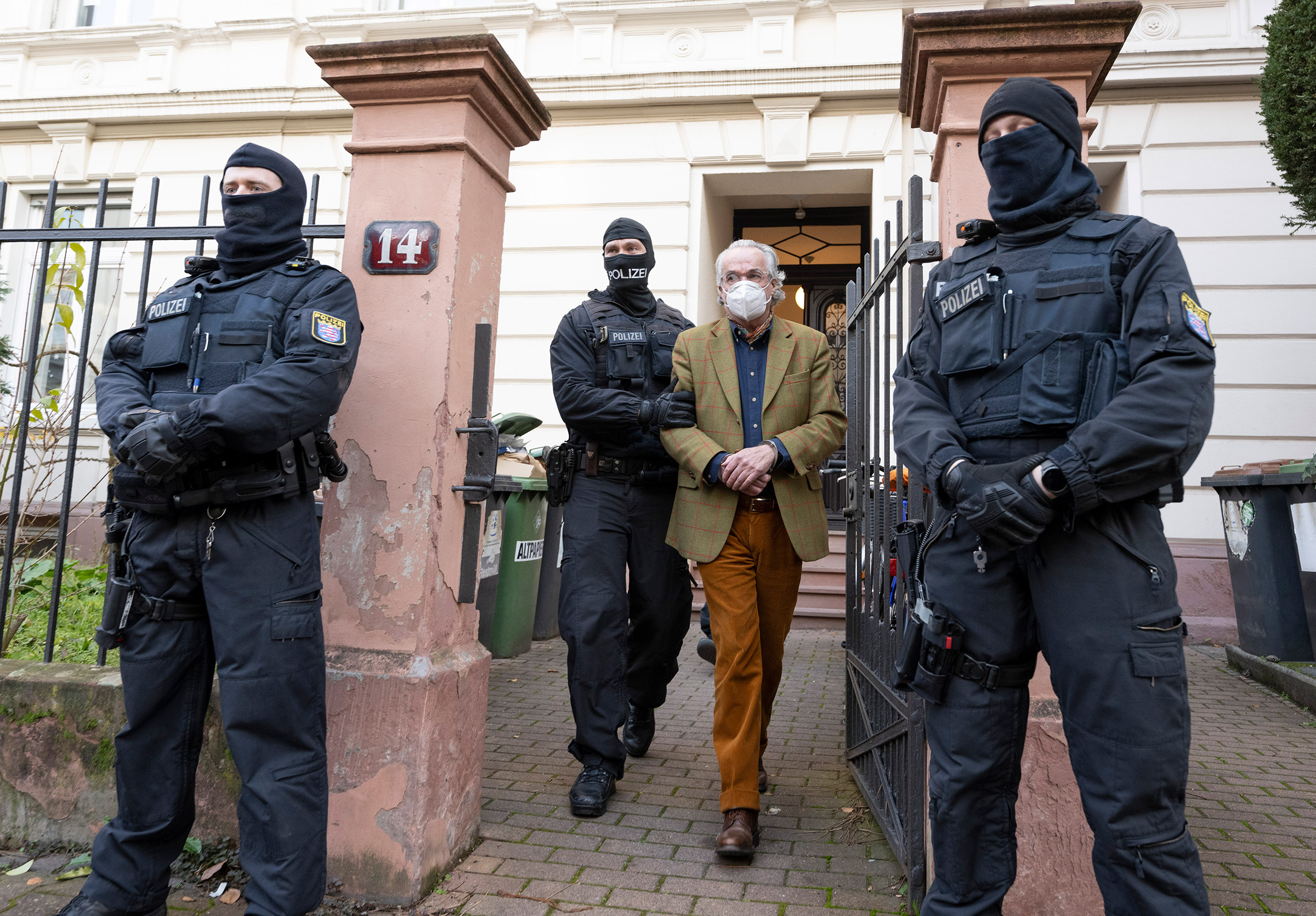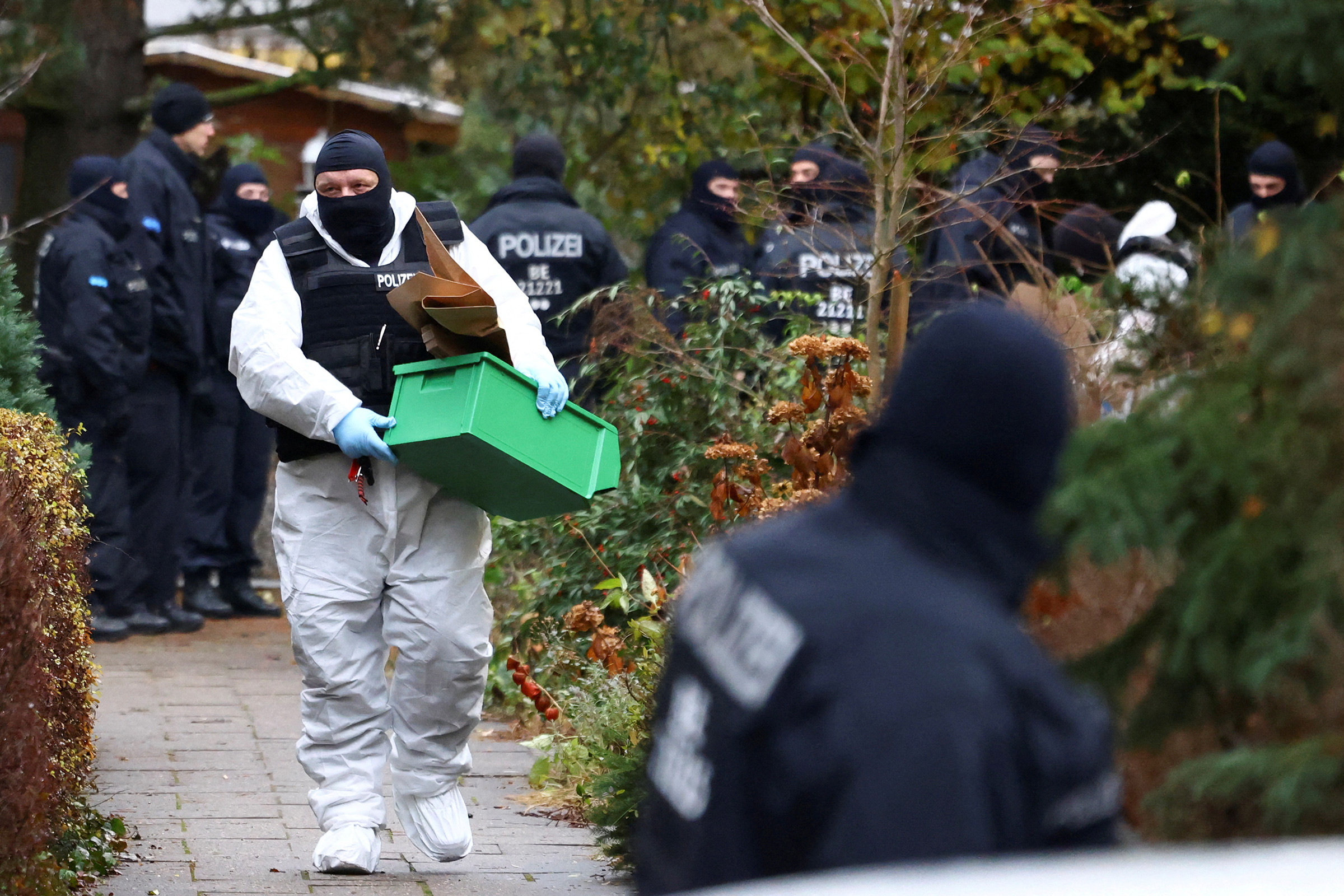
A plot to install a descendant of the German royal family as head of state. Secret outreach to Russian officials for help overthrowing the government in Berlin. Efforts to stockpile weapons and hold firearms trainings. A scheme, influenced by QAnon theories, to incite a civil war to bring so-called “Deep State” elites to justice.
On its face, it all sounds like a delusional fever dream melding old and imported conspiracies and the violent fantasies of online extremist groups. But the Dec. 7 arrest of 25 people allegedly involved in a plan to violently overthrow the German government shows how these narratives are inspiring increasingly militant movements to join forces to attack democratic institutions.
The suspects, all German nationals except for one Russian citizen, had a clear goal, according to prosecutors: the “forcible elimination of the democratic constitutional state.” They were part of a far-right network that began planning an armed insurrection in Nov. 2021, according to prosecutors. The mass raids this week by German police, which involved more than 3,000 officers across 130 locations, were described by media as one of the largest counter-terror operations in the country’s history. Authorities are still investigating 27 other suspects, prosecutors say.
The group was inspired by “a conglomerate of conspiracy myths consisting of narratives of the so-called Reichsbürger and QAnon ideologies,” federal prosecutors said, referring to the “Reich Citizens” movement which believes the modern German state is illegitimate. The Reichsbürger movement espouses many of the same beliefs as the sovereign-citizen movement in the U.S. “They are firmly convinced that Germany is currently governed by members of a so-called ‘deep state,’” the prosecutor’s office said.
Read More: The War in Ukraine Is Emboldening Germany’s Far Right.
But these conspiracies took dangerous form in the real world. The group allegedly recruited people with military training, and attempted to bring in members of the German security services. They allegedly organized arms trainings, formed a shadow cabinet, and made plans to bring down the power grid and take over IT systems. Among the alleged collaborators were a judge and former member of the Bundestag, a German prince, current and former members of the military, and an ex-police chief. According to Germany’s Military Counterintelligence Service, several reservists are also suspects in the plot.
The pattern is strikingly similar in key ways to the “Deep State” conspiracies that led hundreds of Americans to storm the U.S. Capitol. The German plot highlights how elements of these extremist movements have converged, folding in QAnon adherents, COVID-19 conspiracists, and far-right groups, including neo-Nazi extremists. This is especially dangerous because they are increasingly targeting democratic institutions, analysts tell TIME, casting them as an existential threat against which violence is justified.

“You see this transnational solidarity between these various kinds of extremist groups,” says Colin Clarke, a counterterrorism analyst with the security consulting firm Soufan Group, noting the adoption of U.S. Second Amendment rhetoric across borders. “There’s almost like a copycat element.”
Read More: QAnon Candidates Are Winning Local Elections.
The influence of QAnon is a peculiarly American export. The original conspiracy is based on the belief that then-President Donald Trump was fighting an elite “deep state” cabal comprised of Satanist Democratic politicians, Hollywood celebrities and pedophiles. Yet QAnon was enthusiastically embraced by far-right German groups. It inspired the so-called “Querdenker” movement, which emerged during the COVID-19 pandemic and mobilized its members to join anti-lockdown and anti-vaccine protests. Although its original tenets seem relevant only to Americans, it has morphed into an umbrella conspiracy integrating anti-government movements abroad, including the Reichsbürger in Germany.
“It’s definitely being exported from the U.S.,” says Clarke. But “QAnon is remarkably agile and adapts to local circumstances,” he adds. “It’s tailor-made to plug in all these fringe ideas that are then used to justify violence.”
Like similar counterparts in the U.S. and elsewhere, members of the Reichsbürger movement “believe they live under occupation by hostile, illegitimate powers,” according to Jakob Guhl at the Institute for Strategic Dialogue (ISD), a nonprofit that analyzes online extremism. “They therefore see resistance against the state and its representatives as legitimate…from harassment of civil servants and political representatives all the way to taking violent action.”
Messages reportedly posted by people involved in the plot echo common fantasies spread by U.S. far-right extremist groups, which often speak about mass trials and executions of prominent government officials. “Everything will be turned upside down: the current public prosecutors and judges, as well as the heads of the health departments and their superiors will find themselves in the dock at Nuremberg 2.0,” one of the suspects said in a Telegram post before his arrest on Wednesday, according to German newspaper Die Zeit.
The suspects arrested Dec. 7 also allegedly tried to make contact with Russian officials, believing that they were allies in their struggle against the “Deep State.” U.S. far-right movements likewise express admiration for President Vladimir Putin and authoritarian regimes. (There is no indication that the Russians responded to these attempts, according to prosecutors, and a Kremlin spokesman dismissed it as a “German internal problem.”)
As in the U.S., far-right extremism has long been a leading domestic security threat in Germany. In 2020, German intelligence designated far-right extremism as “the biggest danger for democracy in Germany.” That year, hundreds of far-right demonstrators protesting Germany’s pandemic restrictions attempted to storm the Bundestag before being pushed back by police. Many of them had organized on extremist messaging boards and the messaging app Telegram, calling for a “storm on Berlin.” In April 2022, police arrested a woman involved in the Reichsbürger movement for plotting to kidnap German health minister Karl Lauterbach and take down the country’s power grid.
“We underestimate these folks at our own peril by saying they’re lunatics,” says Clarke, noting the number of elite security services involved in the German raids indicate that they were preparing for a bad outcome and mobilized vast resources to tackle the threat. “They’ve winnowed down some of the people who maybe dabbled in conspiracies during the pandemic, but the people that remain are the most hardcore, the most determined and in many cases among the most dangerous,” he adds, “planning and plotting and looking for an opportunity to do something really big.”
More Must-Reads from TIME
- How Donald Trump Won
- The Best Inventions of 2024
- Why Sleep Is the Key to Living Longer
- Robert Zemeckis Just Wants to Move You
- How to Break 8 Toxic Communication Habits
- Nicola Coughlan Bet on Herself—And Won
- Why Vinegar Is So Good for You
- Meet TIME's Newest Class of Next Generation Leaders
Write to Vera Bergengruen at vera.bergengruen@time.com